Eliza Knight's Blog, page 66
October 18, 2011
Historical Novel Review: Song of the Nile by Stephanie Dray
 I recently had the pleasure of reading Stephanie Dray's second novel in her Cleopatra's Daughter series, Song of the Nile.
I recently had the pleasure of reading Stephanie Dray's second novel in her Cleopatra's Daughter series, Song of the Nile.If you'd like to read my review of the first novel, Lily of the Nile, click here.
BOOK INFO : (borrowed from the author's website)
Sorceress. Seductress. Schemer. Cleopatra's daughter has become the emperor's most unlikely apprentice and the one woman who can destroy his empire…
Having survived her perilous childhood as a royal captive of Rome, Selene pledged her loyalty to Augustus and swore she would become his very own Cleopatra. Now the young queen faces an uncertain destiny in a foreign land.Forced to marry a man of the emperor's choosing, Selene will not allow her new husband to rule in her name. She quickly establishes herself as a capable leader in her own right and as a religious icon. Beginning the hard work of building a new nation, she wins the love of her new subjects and makes herself vital to Rome by bringing forth bountiful harvests.But it's the magic of Isis flowing through her veins that makes her indispensable to the emperor. Against a backdrop of imperial politics and religious persecution, Cleopatra's daughter beguiles her way to the very precipice of power. She has never forgotten her birthright, but will the price of her mother's throne be more than she's willing to pay?Berkley Trade October 2011 (Trade Paperback)
# ISBN-10: 0425243044
# ISBN-13: 9780425243046
MY REVIEW: (may contain some spoilers, but not really)
I really really really liked the first book in this series and so I was looking forward to seeing what happened next in Selene's life. She was such a strong young woman with so much going for her. Would she find her brother? What would happen between her and the emperor? Livia? Everyone else? Would she ever regain her mother's kingdom?
This book starts out just as riveting as the last book, pulling me in. The author has done a lot of research into her setting, events during the time period, the people, materials, food, clothing, dye, ships, religion, and so much more. When an author does this extent of research and weaves it into the story so well that I feel I am deep within a the period--as if I time-traveled--then they've done a great job! And Ms. Dray certainly did that.
There is a lot of controversy regarding a topic that takes place in this novel--incest. Please keep reading for a full understanding of this. It was not done in a gross or icky way, and if you read the first story, or have some knowledge on Egyptian culture, then you would realize this was not taboo in the time period. Cleopatra--Selene's own mother--married her brother. Many royals have married within the family to keep the crown, money, lands for themselves. I've read conflicting reviews about the relationship between Selene and her brother. I must say that within the context of this book, it did not bother me for a number of reasons. One: in the first book it is said they are to be married. They've grown up believing they will be married. Two: Selene herself explains that she does not see him as her brother. He is her soul mate, her healer. There is no historical evidence that his relationship actually occurred, but I applaud the author for taking a leap, and for doing it in a tasteful way.
The relationship between Octavia and Selene really puts me through an emotional wringer! I really don't like him--yet I understand him (except for the rape--that I was really tormented over). I am so mad at how he treats her, uses her, I want to jump within the pages and punch him! His wife, Livia, is even worse. I feel so bad for Selene that she has to deal with these people. Now, I must explain why I said I understand him. During that time period, emperor's had to be ruthless to keep their place. They were assassinated by their peers without warning, so I understand why he's the way he is, and Dray did a great job portraying that.
For me, I saw Selene really struggling with becoming an adult. There was so much she had to deal with--a new husband who she despised and also loved at the same time, being raped, having a child, building a country, trying to establish her place in her new kingdom, dealing with negative council members, tribesmen, people altogether, friendships, her relationship with her brother, seeking her mother's kingdom, and oh-so-much more. I can see her becoming depressed, confused, angry, frustrated. It is a struggle that really affects the reader. Sometimes I wanted to shout at her for her decisions and other times I shouted for joy at her triumphs. In the end, Selene came out on top, and I was proud of her. I eagerly look forward to reading the third book.
Well done, Ms. Dray!
If you enjoy reading books in this era, than I would recommend reading Song of the Nile, but be warned it does contain controversial material, and will affect you emotionally as you read.
Cheers,
Eliza
Published on October 18, 2011 04:00
October 17, 2011
My Favorite Royal by Kathleen Bittner Roth
I'd like to welcome back my dear friend, Kathleen Bittner Roth to History Undressed. Some of you may have previously read her article on A Victorian Lady's Toilette. Today she is hear to tell us all about her favorite royal...
 MY FAVORITE ROYALby Kathleen Bittner Roth
MY FAVORITE ROYALby Kathleen Bittner Roth
Never in mywildest dreams had it ever occurred to me that I would one day reside inBudapest. Hungary? A former Communist country? Eastern Europe?
Although I don'tknow how long I might remain here, and even though the circumstances thatbrought me here were downright sad, I felt compelled to commit to a year ofremaining here alone. That one-year date passed October 5th, and hereI am, still waiting for things to sort out in the other country I had lived infor four years—Croatia—another former Communist country.
 What a cityBudapest has turned out to be. What a country. What history. I have fallen inlove! And it just so happens that my favorite historical royal fell in lovewith this country as well—and with a passion so great, she chose to have herfourth and last child here. She raised this daughter as a Hungarian, learned thelanguage (the second hardest language in the world), and spent as much time aspossible in her summer palace twenty miles outside the city.
What a cityBudapest has turned out to be. What a country. What history. I have fallen inlove! And it just so happens that my favorite historical royal fell in lovewith this country as well—and with a passion so great, she chose to have herfourth and last child here. She raised this daughter as a Hungarian, learned thelanguage (the second hardest language in the world), and spent as much time aspossible in her summer palace twenty miles outside the city.
Who was thiswoman? Empress Elizabeth of Austria (1837-1898), nicknamed Sissi (Originalspelling was Sisi) who became a historical icon. Considered the most beautifulwoman in the world during her time, she married Emperor Franz Josef, hercousin, when she was barely sixteen. His domineering mother had arranged ameeting between the young emperor and Sissi's older sister for the purpose ofmarriage, but one look at fifteen-year-old Sissi and the twenty-three-year-old emperortold his mother if he couldn't have Sissi, he wouldn't marry at all. For him,it was love at first sight.
 Sissi, one of tenchildren born in Munich to an eccentric duke, was raised in the wilds ofBavaria when her father ran off and bought a castle far enough away from courtprotocol to avoid his duties. He played and ran free, and so did his children.Sissi could out-shoot, out-ride and out-curse any man, much to her father'sdelight. Like him, she eschewed court rules, and even though she was shy, she rebelledat every turn. Wherever she traveled, a portable gym went with her. Everypalace or castle had a gym installed, and Sissi worked out every day. She atesparingly in order to keep her sixteen inch waist and some say she may havebeen anorexic in her later years.
Sissi, one of tenchildren born in Munich to an eccentric duke, was raised in the wilds ofBavaria when her father ran off and bought a castle far enough away from courtprotocol to avoid his duties. He played and ran free, and so did his children.Sissi could out-shoot, out-ride and out-curse any man, much to her father'sdelight. Like him, she eschewed court rules, and even though she was shy, she rebelledat every turn. Wherever she traveled, a portable gym went with her. Everypalace or castle had a gym installed, and Sissi worked out every day. She atesparingly in order to keep her sixteen inch waist and some say she may havebeen anorexic in her later years.
It was herstubborn, controlling mother-in-law who likely was responsible for Sissi'shealth issues. The woman took Sissi's children away from her to be raised atcourt according to the mother-in-law's demands, refused to allow Sissi tobreast feed, and except for the last child, the daughter, born in Hungary,Sissi never saw much of her children.
Last August, inthe heat of the summer, I had the privilege of visiting her summer palace. Ican see why she loved her home at Godollo. Even though the temperature was inthe 90's the day of my visit, I forgot about the heat once inside the building.All the windows and the many doors to various balconies had been flung open anda breeze flowed through an already light and airy structure. I've visited manypalaces and castles while living abroad, but Sissi's summer palace at Godollois my favorite (it's the second largest baroque palace in the world). The vastgrounds have been left intact (thank God, the Communists didn't ruin it), andthe palace is in remarkable shape.
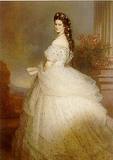 Sadly, Sissi wasassassinated in 1898 by an Italian anarchist. You can read all about her onsites like Wikipedia, you can watch the films made about her life, and evenview her summer castle and her home in Corfu on YouTube, but for me, nothingcompares to the impact of walking through the summer palace where her footstepsonce tread, or hiking the streets of beautiful, amazing Budapest, and seeingthe love people had for her in the form of bridges, statues, cafes and parksnamed after her.
Sadly, Sissi wasassassinated in 1898 by an Italian anarchist. You can read all about her onsites like Wikipedia, you can watch the films made about her life, and evenview her summer castle and her home in Corfu on YouTube, but for me, nothingcompares to the impact of walking through the summer palace where her footstepsonce tread, or hiking the streets of beautiful, amazing Budapest, and seeingthe love people had for her in the form of bridges, statues, cafes and parksnamed after her.
While I may havelanded in Budapest under dire circumstances, I have made the most of my stay, andlately, I actually feel blessed to be here, in a land my favorite royal loved.Below are a few sites that may be of interest to you:
Wikipedia historyof Sissi: http://en.wikipedia.org/wiki/Elisabeth_in_Bavaria
Photos: http://www.youtube.com/watch?v=3cNfk7MD-zA&feature=related
Godollo Palace: http://www.youtube.com/watch?v=uCQFVGrPFTw&feature=related
Hello Budapest: http://www.youtube.com/watch?v=RqwFvU5vBrA
You can visitKathleen's website at www.kathleenbittnerroth.comwhere she writes about the history of Hungary and her life in Budapest on herblog.
 MY FAVORITE ROYALby Kathleen Bittner Roth
MY FAVORITE ROYALby Kathleen Bittner RothNever in mywildest dreams had it ever occurred to me that I would one day reside inBudapest. Hungary? A former Communist country? Eastern Europe?
Although I don'tknow how long I might remain here, and even though the circumstances thatbrought me here were downright sad, I felt compelled to commit to a year ofremaining here alone. That one-year date passed October 5th, and hereI am, still waiting for things to sort out in the other country I had lived infor four years—Croatia—another former Communist country.
 What a cityBudapest has turned out to be. What a country. What history. I have fallen inlove! And it just so happens that my favorite historical royal fell in lovewith this country as well—and with a passion so great, she chose to have herfourth and last child here. She raised this daughter as a Hungarian, learned thelanguage (the second hardest language in the world), and spent as much time aspossible in her summer palace twenty miles outside the city.
What a cityBudapest has turned out to be. What a country. What history. I have fallen inlove! And it just so happens that my favorite historical royal fell in lovewith this country as well—and with a passion so great, she chose to have herfourth and last child here. She raised this daughter as a Hungarian, learned thelanguage (the second hardest language in the world), and spent as much time aspossible in her summer palace twenty miles outside the city. Who was thiswoman? Empress Elizabeth of Austria (1837-1898), nicknamed Sissi (Originalspelling was Sisi) who became a historical icon. Considered the most beautifulwoman in the world during her time, she married Emperor Franz Josef, hercousin, when she was barely sixteen. His domineering mother had arranged ameeting between the young emperor and Sissi's older sister for the purpose ofmarriage, but one look at fifteen-year-old Sissi and the twenty-three-year-old emperortold his mother if he couldn't have Sissi, he wouldn't marry at all. For him,it was love at first sight.
 Sissi, one of tenchildren born in Munich to an eccentric duke, was raised in the wilds ofBavaria when her father ran off and bought a castle far enough away from courtprotocol to avoid his duties. He played and ran free, and so did his children.Sissi could out-shoot, out-ride and out-curse any man, much to her father'sdelight. Like him, she eschewed court rules, and even though she was shy, she rebelledat every turn. Wherever she traveled, a portable gym went with her. Everypalace or castle had a gym installed, and Sissi worked out every day. She atesparingly in order to keep her sixteen inch waist and some say she may havebeen anorexic in her later years.
Sissi, one of tenchildren born in Munich to an eccentric duke, was raised in the wilds ofBavaria when her father ran off and bought a castle far enough away from courtprotocol to avoid his duties. He played and ran free, and so did his children.Sissi could out-shoot, out-ride and out-curse any man, much to her father'sdelight. Like him, she eschewed court rules, and even though she was shy, she rebelledat every turn. Wherever she traveled, a portable gym went with her. Everypalace or castle had a gym installed, and Sissi worked out every day. She atesparingly in order to keep her sixteen inch waist and some say she may havebeen anorexic in her later years. It was herstubborn, controlling mother-in-law who likely was responsible for Sissi'shealth issues. The woman took Sissi's children away from her to be raised atcourt according to the mother-in-law's demands, refused to allow Sissi tobreast feed, and except for the last child, the daughter, born in Hungary,Sissi never saw much of her children.
Last August, inthe heat of the summer, I had the privilege of visiting her summer palace. Ican see why she loved her home at Godollo. Even though the temperature was inthe 90's the day of my visit, I forgot about the heat once inside the building.All the windows and the many doors to various balconies had been flung open anda breeze flowed through an already light and airy structure. I've visited manypalaces and castles while living abroad, but Sissi's summer palace at Godollois my favorite (it's the second largest baroque palace in the world). The vastgrounds have been left intact (thank God, the Communists didn't ruin it), andthe palace is in remarkable shape.
 Sadly, Sissi wasassassinated in 1898 by an Italian anarchist. You can read all about her onsites like Wikipedia, you can watch the films made about her life, and evenview her summer castle and her home in Corfu on YouTube, but for me, nothingcompares to the impact of walking through the summer palace where her footstepsonce tread, or hiking the streets of beautiful, amazing Budapest, and seeingthe love people had for her in the form of bridges, statues, cafes and parksnamed after her.
Sadly, Sissi wasassassinated in 1898 by an Italian anarchist. You can read all about her onsites like Wikipedia, you can watch the films made about her life, and evenview her summer castle and her home in Corfu on YouTube, but for me, nothingcompares to the impact of walking through the summer palace where her footstepsonce tread, or hiking the streets of beautiful, amazing Budapest, and seeingthe love people had for her in the form of bridges, statues, cafes and parksnamed after her. While I may havelanded in Budapest under dire circumstances, I have made the most of my stay, andlately, I actually feel blessed to be here, in a land my favorite royal loved.Below are a few sites that may be of interest to you:
Wikipedia historyof Sissi: http://en.wikipedia.org/wiki/Elisabeth_in_Bavaria
Photos: http://www.youtube.com/watch?v=3cNfk7MD-zA&feature=related
Godollo Palace: http://www.youtube.com/watch?v=uCQFVGrPFTw&feature=related
Hello Budapest: http://www.youtube.com/watch?v=RqwFvU5vBrA
You can visitKathleen's website at www.kathleenbittnerroth.comwhere she writes about the history of Hungary and her life in Budapest on herblog.
Published on October 17, 2011 05:10
October 15, 2011
Weekly Video: Tony Robinson's Worst Jobs in History
Welcome to this week's history video from YouTube! Tony Robinson's The Worst Jobs in History series: The Middle Ages Part 1 . Enjoy!
Published on October 15, 2011 06:37
October 14, 2011
Worst Jobs in History
 A couple of years ago, I saw a series on The History Channel called, the Worst Jobs in History. It was a fascinating series. Some of the show is posted on YouTube. Click to visit. Anyways, after seeing that show, I become completely enthralled with medieval jobs and all the ways in which society worked. Naturally I had to find more horrible jobs.
A couple of years ago, I saw a series on The History Channel called, the Worst Jobs in History. It was a fascinating series. Some of the show is posted on YouTube. Click to visit. Anyways, after seeing that show, I become completely enthralled with medieval jobs and all the ways in which society worked. Naturally I had to find more horrible jobs.For today's post, I'm just going to go over what I like to call Lowly Jobs of the Middle Ages. And when I'm done, I have a fun little test for you!
* When you go to the store today and buy that cozy wool sweater or blanket, you may go home thinking it was hand made or that it was made by machines. You don't really know or care maybe how it was made. I don't know how it was made today, and I'm hoping wool fabrics were are made differently now than
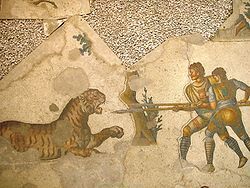 they were in the middle ages… The job of a fuller was to make the wool cloth nice and soft and pliable—easy to work with and smooth against the skin. Well break out the nose-pins, gas masks and vomit buckets, because today your work begins! A fuller's job was to walk up and down huge vats of nasty stale urine in which the wool sat. And they had to do it ALL DAY! I shudder just thinking about it…no thanks!
they were in the middle ages… The job of a fuller was to make the wool cloth nice and soft and pliable—easy to work with and smooth against the skin. Well break out the nose-pins, gas masks and vomit buckets, because today your work begins! A fuller's job was to walk up and down huge vats of nasty stale urine in which the wool sat. And they had to do it ALL DAY! I shudder just thinking about it…no thanks!* I'm sure I've mentioned it before, but back in the middle ages, it just wasn't fashionable for noblewomen to breastfeed their babies. But even back then they believed breast is best. No goat or cows milk for their babies. What a dilemma! *Snaps fingers* Got it! Get a sturdy and robust peasant woman to be your wetnurse. Yup, your job as a wetnurse is to allow the babes of noble blood to suckle from your breasts, and nourish the child for at least the first 1-2 years of its life. But what about your own babies? Well, the "cream" of the crop, so to speak, went first to the nobles babies. If there was anything left it went to the peasant wetnurses babes. But more likely than not the wetnurse's own children either starved or fed on cow's and goat's milk.
* Today's the day you might die, or get seriously injured. But it's all worth it, because in too many years to count, and you'll probably be dead by then, you will be a knight! Who are you? You're an arming-squire. Sounds heroic doesn't it? Well it is, if you make it. You're mission, should you choose to accept it is to run out into battle--unarmed, mind you—to arm your master when his current coverings become damaged or displaced. When he's done fighting, and you're still alive, you get to clean the blood, sweat, mud and excrement—yes, excrement—from his armor. Sounds glamorous doesn't it?
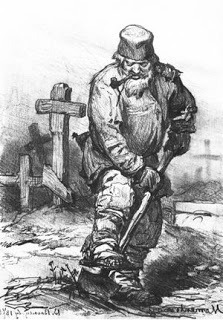 * The job of a gravedigger may not have been pleasant but it sure was profitable. Why? Because everyone was dying of disease and plagues. You didn't live too long back then. The only set back to being a gravedigger was, you might catch a disease from the dead—no matter how much money you make, I'd rather not handle diseases carcasses all day. But if that's your cup o' tea, grab a shovel!
* The job of a gravedigger may not have been pleasant but it sure was profitable. Why? Because everyone was dying of disease and plagues. You didn't live too long back then. The only set back to being a gravedigger was, you might catch a disease from the dead—no matter how much money you make, I'd rather not handle diseases carcasses all day. But if that's your cup o' tea, grab a shovel! * Come on you lowly sapper! I know you don't have any skills, and that's why you'll spend your day digging. Get back to digging that tunnel! You've got a mine to dig next.
* Grab that oar! Row! Row! Row! Today you're a thole-sitter, also known as a Saxon oarsman, and no you aren't traveling with other Saxon's unless they are rowing with you. You make your job on a Viking ship, a terrifying place, so you better keep your wits about you, and hopefully you don't frighten too easily. You'll be the motor getting them where they want to be, and should the ship take on water, its your job to scoop it out—and you'll have to do it with your hands most likely.
* Feel like bleeding to death? Or is it blood letting to death? Or blood sucked to death? Not sure what you want to call it, but if you're the leech-collector, you'll be tramping around in the marshes and reed beds, and let those little worm-like creatures attach to your calves and other body parts. But you better rip them off quickly before they suck the life from you! Shove them in a jar, then when you get home—if you make it--ship them off to the nearest medical practitioner.
* Looking for a job that doesn't require much skill other than carrying water and heating it up for noblemen and women? I've got the perfect position for you! Today you'll be an ewerer. Don't burn yourself!
* Like to clean? How about cleaning a kitchen—without the benefit of Lysol. Welcome to the life of a scullion. Doesn't that job title sound hard? I mean when I hear "scullion" I picture someone scrubbing floors, counters, table tops, walls and pots until the skin literally peels away from their fingers.
* Being a cottar must have been very confusing. From day to day, week to week, you weren't sure what you'd be doing. And as a lowly peasant, it wasn't like you had money to live off of if the lord decided he didn't need you to work that day. But what would he have your doing? You may be a swine-herder today and a prison guard tomorrow. Or maybe you'd be helping fix the roof, or dig a moat. You just never know. A cottar was like a temp worker. Whatever need was needed, that's where you went.
* Hello, Mr. Gong-Farmer. You may be called a farmer, but what your farming is nothing but a bunch of bodily waste...Eww! So gong must be…yeah, yuck. Have you ever been to a castle or read about how the nobles went potty? Well high up on the 2nd and 3 [image error] rd floors were little rooms called garderobes. Sounds fancy doesn't it? They were just rock slabs with holes in them that you sat on and did your business. That hole led down to a gong pit, and you got it, the gong farmer's job was to clean that out…
* Your lord has decided he'd like some men to sing soprano, but he wants a two for oner. He needs guards for the ladies chambers too. Hello, over there! You're going to be a eunuch. Sorry, but we'll have to remove a special part of your anatomy. Can't risk you seducing the ladies.
* You might die today, you might not, depends on how well you fight and entertain the people. Yup, you're the new gladiator. Fight the lions, fight other gladiators, fight seasoned warriors. But whatever you do, fight hard, because today might be your last. And its all for the sake of entertaining the gawkers in the stands.
* Got a special talent for catching those nasty little vermin called rats? Hear the call from the castle? "The castle is filled with rats! Help us!" Time to get to work—and you've surely got your work cut out for you, today you're a ratcatcher.
Now for your test! I made a crossword puzzle at my website if you'd like to have some fun! Check it out: Lowly Jobs of the Middle Ages. Remember that some of these job titles are two words and may have a dash in the middle, although some of them don't—courtesy of the computer being selective. Feel free to check out some of the other crosswords I've made too, they are posted there.
Enjoy!
Eliza
Published on October 14, 2011 05:31
Guest Author Tara Kingston: Cloak and Dagger...those fabulous British Spies!
Welcome back to History Undressed, author of sizzling hot historical romance, Tara Kingston!
Cloakand Dagger...those fabulous British Spies!by Tara Kingston I have a confession...this blogwill not deal with spies who made any impact on the events of nations...nope, thesespies weren't even real. My blog this month is a tribute to spies in literatureand film. I've always been a fan of spies in literature, movies and televisionshows. Even now, I do a little glee-filled dance each time a disc with oldepisodes of the Avengers arrives in the mail. I love the characters of EmmaPeel and John Steed, and must admit that I am among those in the world wholoved the Avengers movie with Uma Thurman and Ralph Fiennes, regardless of thecritics' opinions. Intrigue, sophistication, and secrecy...delightful!
I have a confession...this blogwill not deal with spies who made any impact on the events of nations...nope, thesespies weren't even real. My blog this month is a tribute to spies in literatureand film. I've always been a fan of spies in literature, movies and televisionshows. Even now, I do a little glee-filled dance each time a disc with oldepisodes of the Avengers arrives in the mail. I love the characters of EmmaPeel and John Steed, and must admit that I am among those in the world wholoved the Avengers movie with Uma Thurman and Ralph Fiennes, regardless of thecritics' opinions. Intrigue, sophistication, and secrecy...delightful!
 Nothing against Americans inespionage...Jack Ryan and Jason Bourne can certainly speed my pulse...but myfavorite cloak and dagger characters are Brits through and through. Thecombination of a suave demeanor, English accent, and daring exploits is utterlyirresistible.
Nothing against Americans inespionage...Jack Ryan and Jason Bourne can certainly speed my pulse...but myfavorite cloak and dagger characters are Brits through and through. Thecombination of a suave demeanor, English accent, and daring exploits is utterlyirresistible.
Of course, the most well-knownpop culture spy is Bond, James Bond. Created by Ian Fleming, James Bond remainsthe gold standard in fictional espionage. Despite his many film incarnationswith actors who don't even resemble each other (of course, one could say thesame of Batman), one thing stays the same: he's the alpha male's alpha male.Daring, smart, and never in need of a nap, he's virility and daringpersonified. Many think Sean Connery's portrayal of Sir Ian Fleming's daringhero is the superlative incarnation, but I think Daniel Craig has made thecharacter his own. Gritty and real, he brings a human quality to the Bondcharacter that I feel Connery lacked. I also liked Roger Moore's twinkle in theeye...a totally different take on the character, but very much in keeping withthe irreverence of the seventies.
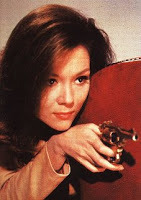
Emma Peel is my idol. Nearlyfifty years after the Avengers first aired, Diana Rigg's portrayal ofthe sleek agent remains the epitome of a female spy. Witty, sophisticated, andthe intellectual superior of the men who were foolish enough to confront her,she set the bar high. Ah, to slink along in a cat suit and disarm men with awell-placed kick...such is the fodder of my dreams. Her partner in espionage,John Steed, was immaculately attired and painstakingly well-mannered, yet hecould kill a man with his hat and his umbrella without breaking a sweat.Impressive, indeed!
 And then, you haveAustin...Austin Powers, that is. Yeah, Baby! This character blends the suave,lady-killer spies of the sixties and seventies into one "hairy-like-animal"creation who's bold, a bit obtuse, and ultimately quite a sympatheticcharacter. As a fan of sixties spy flicks, Mike Myers' homage to slick spieslike In Like Flint's Derek Flint, James Bond and Michael Caine's HarryPalmer with a touch of Dr. Strangelove mixed in for good measure was a perfectguilty pleasure. I admit to feeling a surge of excitement each time there's amention of Austin Powers 4 in the works...oh, if only my dreams would cometrue...
And then, you haveAustin...Austin Powers, that is. Yeah, Baby! This character blends the suave,lady-killer spies of the sixties and seventies into one "hairy-like-animal"creation who's bold, a bit obtuse, and ultimately quite a sympatheticcharacter. As a fan of sixties spy flicks, Mike Myers' homage to slick spieslike In Like Flint's Derek Flint, James Bond and Michael Caine's HarryPalmer with a touch of Dr. Strangelove mixed in for good measure was a perfectguilty pleasure. I admit to feeling a surge of excitement each time there's amention of Austin Powers 4 in the works...oh, if only my dreams would cometrue...
My recent Ellora's Cave release,Claimed by the Spymaster, was inspired by my longstanding fascinationwith spies. If I had to say which pop culture spy I had in mind, it would beRalph Fiennes' portrayal of John Steed. British spy Alec Jameson issophisticated, cultured, and lethal, and he'll stop at nothing to capture atraitor to Queen Victoria's empire.
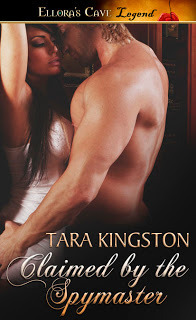 Here's a little about the story:
Here's a little about the story:
Russian actress Valentina Baranovatravels to England to marry, but the arrangement is definitely not a lovematch. Betrothed to a cunning and ruthless English lord, she's the sweetener ina deal that will put stolen British documents in Russian hands and curry theCzar's favor for her father. Determined to escape her loathsome intended, sheflees him—and promptly falls into the hands of his most bitter enemy. An enemywho stirs her like no other.
Spy for the crown Alec Jameson,Lord Carrington, is on a mission—unmask the traitor responsible for hisbrother's death before the blackguard can further betray Queen Victoria'sempire. Capturing Valentina to use as bait, he spirits her away from London.Despite his efforts to resist the alluring captive he's snatched from hisenemy's grasp, Alec claims Valentina in the most carnal way possible. Once thebeauty has been in his bed, he wants her for his own. But she must lay siege toa long-untouched part of Alec's existence—his heart.
Claimed by the Spymaster is available from Ellora's Cave, Amazon, Barnes and Noble, and All Romance E-Books.
Contest:
Which fictional spy is yourfavorite? Share your top cloak-and-dagger heroes and heroines...one commenterwill be selected to receive an e-book of Claimedby the Spymaster.
I'dlove to hear from you. Friend me on Facebook and follow me on Twitter .

Cloakand Dagger...those fabulous British Spies!by Tara Kingston
 I have a confession...this blogwill not deal with spies who made any impact on the events of nations...nope, thesespies weren't even real. My blog this month is a tribute to spies in literatureand film. I've always been a fan of spies in literature, movies and televisionshows. Even now, I do a little glee-filled dance each time a disc with oldepisodes of the Avengers arrives in the mail. I love the characters of EmmaPeel and John Steed, and must admit that I am among those in the world wholoved the Avengers movie with Uma Thurman and Ralph Fiennes, regardless of thecritics' opinions. Intrigue, sophistication, and secrecy...delightful!
I have a confession...this blogwill not deal with spies who made any impact on the events of nations...nope, thesespies weren't even real. My blog this month is a tribute to spies in literatureand film. I've always been a fan of spies in literature, movies and televisionshows. Even now, I do a little glee-filled dance each time a disc with oldepisodes of the Avengers arrives in the mail. I love the characters of EmmaPeel and John Steed, and must admit that I am among those in the world wholoved the Avengers movie with Uma Thurman and Ralph Fiennes, regardless of thecritics' opinions. Intrigue, sophistication, and secrecy...delightful! Nothing against Americans inespionage...Jack Ryan and Jason Bourne can certainly speed my pulse...but myfavorite cloak and dagger characters are Brits through and through. Thecombination of a suave demeanor, English accent, and daring exploits is utterlyirresistible.
Nothing against Americans inespionage...Jack Ryan and Jason Bourne can certainly speed my pulse...but myfavorite cloak and dagger characters are Brits through and through. Thecombination of a suave demeanor, English accent, and daring exploits is utterlyirresistible.Of course, the most well-knownpop culture spy is Bond, James Bond. Created by Ian Fleming, James Bond remainsthe gold standard in fictional espionage. Despite his many film incarnationswith actors who don't even resemble each other (of course, one could say thesame of Batman), one thing stays the same: he's the alpha male's alpha male.Daring, smart, and never in need of a nap, he's virility and daringpersonified. Many think Sean Connery's portrayal of Sir Ian Fleming's daringhero is the superlative incarnation, but I think Daniel Craig has made thecharacter his own. Gritty and real, he brings a human quality to the Bondcharacter that I feel Connery lacked. I also liked Roger Moore's twinkle in theeye...a totally different take on the character, but very much in keeping withthe irreverence of the seventies.

Emma Peel is my idol. Nearlyfifty years after the Avengers first aired, Diana Rigg's portrayal ofthe sleek agent remains the epitome of a female spy. Witty, sophisticated, andthe intellectual superior of the men who were foolish enough to confront her,she set the bar high. Ah, to slink along in a cat suit and disarm men with awell-placed kick...such is the fodder of my dreams. Her partner in espionage,John Steed, was immaculately attired and painstakingly well-mannered, yet hecould kill a man with his hat and his umbrella without breaking a sweat.Impressive, indeed!
 And then, you haveAustin...Austin Powers, that is. Yeah, Baby! This character blends the suave,lady-killer spies of the sixties and seventies into one "hairy-like-animal"creation who's bold, a bit obtuse, and ultimately quite a sympatheticcharacter. As a fan of sixties spy flicks, Mike Myers' homage to slick spieslike In Like Flint's Derek Flint, James Bond and Michael Caine's HarryPalmer with a touch of Dr. Strangelove mixed in for good measure was a perfectguilty pleasure. I admit to feeling a surge of excitement each time there's amention of Austin Powers 4 in the works...oh, if only my dreams would cometrue...
And then, you haveAustin...Austin Powers, that is. Yeah, Baby! This character blends the suave,lady-killer spies of the sixties and seventies into one "hairy-like-animal"creation who's bold, a bit obtuse, and ultimately quite a sympatheticcharacter. As a fan of sixties spy flicks, Mike Myers' homage to slick spieslike In Like Flint's Derek Flint, James Bond and Michael Caine's HarryPalmer with a touch of Dr. Strangelove mixed in for good measure was a perfectguilty pleasure. I admit to feeling a surge of excitement each time there's amention of Austin Powers 4 in the works...oh, if only my dreams would cometrue...My recent Ellora's Cave release,Claimed by the Spymaster, was inspired by my longstanding fascinationwith spies. If I had to say which pop culture spy I had in mind, it would beRalph Fiennes' portrayal of John Steed. British spy Alec Jameson issophisticated, cultured, and lethal, and he'll stop at nothing to capture atraitor to Queen Victoria's empire.
 Here's a little about the story:
Here's a little about the story:Russian actress Valentina Baranovatravels to England to marry, but the arrangement is definitely not a lovematch. Betrothed to a cunning and ruthless English lord, she's the sweetener ina deal that will put stolen British documents in Russian hands and curry theCzar's favor for her father. Determined to escape her loathsome intended, sheflees him—and promptly falls into the hands of his most bitter enemy. An enemywho stirs her like no other.
Spy for the crown Alec Jameson,Lord Carrington, is on a mission—unmask the traitor responsible for hisbrother's death before the blackguard can further betray Queen Victoria'sempire. Capturing Valentina to use as bait, he spirits her away from London.Despite his efforts to resist the alluring captive he's snatched from hisenemy's grasp, Alec claims Valentina in the most carnal way possible. Once thebeauty has been in his bed, he wants her for his own. But she must lay siege toa long-untouched part of Alec's existence—his heart.
Claimed by the Spymaster is available from Ellora's Cave, Amazon, Barnes and Noble, and All Romance E-Books.
Contest:
Which fictional spy is yourfavorite? Share your top cloak-and-dagger heroes and heroines...one commenterwill be selected to receive an e-book of Claimedby the Spymaster.
I'dlove to hear from you. Friend me on Facebook and follow me on Twitter .
Published on October 14, 2011 02:00
October 10, 2011
MEDIEVAL BESTIARIES by Joyce DiPastena
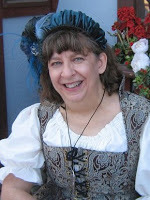 Today on History Undressed we have guest author, Joyce DiPastena, posting on Medieval Bestiaries--a topic not previously discussed on HU, and I think you will find quite interesting! Enjoy!
Today on History Undressed we have guest author, Joyce DiPastena, posting on Medieval Bestiaries--a topic not previously discussed on HU, and I think you will find quite interesting! Enjoy!MEDIEVAL BESTIARIESby Joyce DiPastena
Bestiary: a collection of drawings or paintings of animals,real or imagined, accompanied by their physical and allegorical descriptions.
Illumination: The medieval art ofdecorating books with miniatures or ornamental designs painted in brilliantcolors or silver or gold leaf to "illuminate" or bring light to the pages.

Medieval bestiaries play a small role in mymedieval romance, Illuminationsof the Heart . My heroine's brother "illuminates" abestiary to prove to his illuminator father that he's ready to be advanced fromapprenticeship in their shop. After her brother and father die, my heroine,Siri, practices her own drawing skills in the gardens of her new guardian, Tristonde Brielle, while sitting with Triston's young son Perrin and cousin Acelet.While conversing with them both about her new home, she draws a bee with acrown hovering above it in the air, and explains to Perrin that swarms of beesare led by a king bee. Yes, it's the very opposite of what we know about beestoday, and a friend who read my book challenged my writing of this scene. I hadto explain to her that in the Middle Ages, people not only believed that beeswere lead by a king rather than a queen, but that bees, like most of the animalkingdom, represented some kind of allegory, or moral story, to the people ofthe Middle Ages.
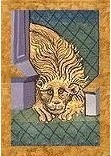
The scene in my story, with the allegory ofthe bee, went like this. (A note: The Young King refers to the eldest son ofKing Henry II of England, who was crowned co-ruler with Henry in his lifetime.)
Politics were neverspoken of at the table. But Acelet knew no such restraint when he joined Siriin the garden.
"I caught a glimpse ofhim once," Acelet said one morning.
He lay sprawled in thegrass beside the dog Talbot, while Perrin leaned against Siri and watched hersketch a swarm of honeybees hovering over an array of flowers. This time Acelethad added vertical slashes to the breast of his surcote as well as the sleeves,exposing the bright green tunic beneath. It was, he had informed Siriearnestly, the way the young knights had dressed at the Court of Poitiers whenhis mother sat in the Queen's circle. Lucianna muttered over her stitchery thatthey must have looked like devils. Siri thought lunatics a more apt word. Shedistracted herself with Perrin before the laughter that bubbled inside hercould escape.
"Soon I will show youmy paints," she told the boy. "Then we will turn these flowers yellow and redand green. Who did you catch a glimpse of, Acelet?"
"The Young King. Threeyears ago, just after I came to Vere. Triston had been commanded to join DukeRichard's siege of Chateauneuf, but he was ill, so he sent his brother,Etienne, in his place. The Young King was at Chateauneuf as well. When wordcame that he left before the siege was over and that Etienne and some otherPoitevins had left with him, Triston sent me to inquire as to the rumor'struth. I found Etienne with Sir Raynor de Molinet in the Young King's camp.Etienne refused to return, and as I watched them ride away, I saw the YoungKing in the forefront."
His voice hushed, asif in awe of his memories. "He was glorious, rubies sparkling from his coronet,his gold hair gleaming in the sun, his tall frame draped in scarlet and gilt…His every movement was one of charm and grace, and when he turned his head andI saw the beauty in his face—"
"Why did you do that,Lady Siri?" Perrin pulled on Siri's sleeve as she finished drawing a smallcrown over one of the bees. She guessed that he had heard his cousin'sbreathless recital too many times before to be impressed with it now.
"Because bees are ledby a king, as are we," she said, ignoring the resentful glance Acelet sent atthe boy. "He is a most benevolent ruler, leading by example and never turninghis sting upon malefactors. He has only to demonstrate to them the error oftheir ways, and in shame they will turn their own stings upon themselves."
"Papa says King Henryis a benevolent ruler."
"Ha!" Acelet'sscornful laugh woke the dozing Talbot. The hound gave a bark. Acelet pulledgently on one of Talbot's ears, but said, "The old king is a tyrant, crushingour people through his war-hungry son. We were a free people before theAngevins came. Now they seek to take away our liberties, and because we do notwant to surrender them, the King sets Duke Richard to ravage us like a wolfamong the sheep."
In the medieval world, each animal, like thebee, represented some sort of moral example or symbolism that humans wereencouraged to follow if the symbolism was good (like the bee), or avoid if thesymbolism was bad (like the crocodile, which represented hypocrisy with the"false tears" it shed after eating any unfortunate human who stumbled acrossits path).
In her book, Medieval Beasts , Ann Paynerecreates a medieval bestiary complete with over seventy full-colorillustrations borrowed from actual medieval bestiaries found in The BritishLibrary. She covers animals (lion, tiger, elephant, camel, hedgehog, ants, the mythicalleucrota—bred from a hyena and a lioness!—and more); birds (eagle, vulture, ostrich, phoenix, siren,bats and bees—yes, the latter two were considered to fall into the "birdfamily"—and more); reptiles (viper, asp, boa, salamander, dragon, basilisk, and more); and fish (fish, sera, dolphin, and whale).If you are interested in sampling a modernreproduction of a medieval bestiary, MedievalBeasts by Ann Payne is a delightful place to start!
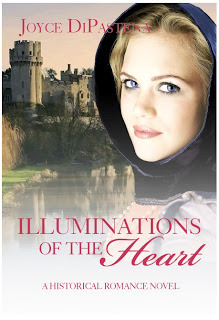
ABOUT ILLUMINATIONS OF THE HEART :
"Clothilde."
He spoke the name on a breath like a prayer. Then he loweredhis head and kissed her.
Her heart is lost in that first embrace, her world shaken toits foundations. There is just one problem. Her name is not Clothilde. It isSiriol de Calendri.
Trained in the art of illumination in the far off city ofVenice, Siri is directed by her late brother's will to the county of Poitou inFrance, where she enters the guardianship of her brother's friend, Sir Tristonde Brielle. Once in Poitou, Siri hopes to find employment in an illuminator'sshop—until Triston unexpectedly snatches her heart away with a kiss.
Triston is a man of quiet honor and courage, but the guilthe carries for the death of his late wife, Clothilde, has left him numb andhesitant to love again. Worse yet, Siri bears an uncanny resemblance to hislost love. Or does she? Her merry laughter and twinkling eyes are verydifferent from his late wife's shy smiles and quiet ways. Yet when he gazesinto Siri's face, all he is able to see is Clothilde.
Then Triston's past returns to threaten them both. Will histragic life with Clothilde be repeated with Siri? Trapped between the rivalryof the king's sons on the one hand and a neighbor out for vengeance on theother, Triston realizes it would be safer to send Siri away. But how can hebear to lose her again?
Siri is determined not to be cast off and not to live inanother woman's shadow. She has illuminated many a priceless book with pen andpaint. But can her own vibrant spirit illuminate the darkness in Triston's souland make his heart beat for her alone?
ABOUT THE AUTHOR:
Joyce DiPastena moved from Utah to Arizona at the age of twoand grew up to be a dyed-in-the-fur desert rat. She first fell in love with theMiddle Ages when she read Thomas B. Costain's The Conquering Family inhigh school. She attended the University of Arizona, where she graduated with adegree specializing in medieval history. Joyce loves the Arizona RenaissanceFestival, where she does annual book signings, and which she has not missedonce in its twenty three years of existence. (She was making annual treks longbefore she had a book to sign.)
Illuminations of he Heart tells the story of Triston, acharacter from Joyce's first medieval romance, Loyalty's Web . Her thirdmedieval romance, Dangerous Favor , will be released in January 2012. You can readmore about her books on her website at http://www.joyce-dipastena.com,find out "what she's up to now!" on her JDP NEWS blog (http://jdp-news.blogspot.com) orfollow along while she researches her novels at Medieval Research with Joyce (http://medievalresearch.blogspot.com).
Published on October 10, 2011 06:20
October 7, 2011
Historical Romance - Blending Fact with Emotion by Victoria Gray
Welcome back to History Undressed my good friend and author, Victoria Gray! She's here with us today, not only celebrating another release (can't wait to read it!), but chatting about a hot topic amongst readers and writers alike--blending fact with fiction. Don't forget to enter the contest for a chance to win an ebook of Victoria's novel, Surrender to Your Touch.
Historical Romance – Blending Fact with Emotionby Victoria Gray
Whydo I love reading and writing historical romance? The answer is actually quite simple. Historical romances transport me to anothertime and place and immerse me in a love story. Before I started writing historical romance, I never considered the skillfulbalance between facts and emotion in these stories, the delicate weave of detailswithin a love story that creates a sense of time and place and brings the plotand the characters to life. Now, as awriter of historical romance, I know firsthand the challenge of blending factsinto a story without creating information overload.
Whilethe developing emotional relationship between the heroine and her hero is thecentral focus of historical romance, historical details serve to sweep thereader away to another time and place. Infusingfacts throughout the story without sounding like a travel guide is a writer'schallenge. Research, layering details throughmultiple revisions, and a willingness to cut facts that don't enhance the storyare my keys to achieving balance between historical detail, story flow, andemotional intensity.
Ofcourse, thorough research is a given. Historicalinaccuracies pull a reader out of a story, while details about historicalevents, clothing, food, transportation, communication, occupations, and socialstructure—the list could go on and on— provide scaffolding for a believablestory.
AfterI become familiar with the essential characteristics of an era, I map out theplot and research specific aspects of the time period that may factor into thestory. What weapons were available? What historical events, landmarks, and peoplemight have impacted the characters' lives? What literary and artistic workswere prominent during that era? In mynew release, Surrender to Your Touch, theUnion occupation of Norfolk, Virginia during the Civil War creates additionaldanger for the hero, outcast Rebel officer Will Reed, while the Union's use ofhis family's historical home, a James River plantation, adds to Will's profoundsense of loss. Angel in My Arms features Union spy Amanda Emerson's visit to Confederatefirst lady Varina Davis and her mission to Richmond's Libby Prison to rescue adouble agent, while Destiny factors the heroine's love of tragic romances into thecharacter's development. Research to identifypopular authors of the heroine's time provided details that fleshed out EmmaDavenport's actions and dialogue. Thesehistorical details add to the tapestry of the story.
Howmuch historical detail brings a story to life without bogging it down? That depends on the story. Are historical events plot elements, or doesthe historical setting provide a context for the story? Surrenderto Your Touch, Angel in My Arms and Destinyare set against the background of the Civil War, but the key plot events areentirely fictional. Historical detailswoven throughout the story create a sense of time and place, and references tohistorical figures can add to a character's development, but historical name-droppingcan result in detail overload. Yourcharacters shouldn't sound like Joan Rivers on a time travel adventure.
Everyauthor develops a method that works best for him or her. To me, research, layering details, andrevision are the keys to crafting a love story that transports the reader toanother time and place.
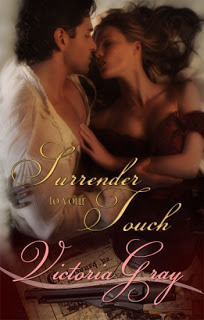 Here's alittle about Surrender to Your Touch:
Here's alittle about Surrender to Your Touch:
Will Reed is out to settle a brutal score. Thedisgraced Rebel officer's own men want him hanged, and an enemy has ordered himkilled. Intent on clearing his name and evening the score with thosewho betrayed him, he begins with the woman he once loved—Union spy KateSinclair.
For years, Kate used seduction as a lure. She knew betterthan to let her heart get involved--until she fell in love with Will. Grievinghis death, Kate's joy at discovering him alive shatters when she is confrontedby a bitter, vengeful man—a man who'll stop at nothing to learn the truth ofher betrayal. As danger pursues them, Kate fights to tear down the barriersWill has erected around his heart, but her most powerful weapon may ultimatelydestroy her—surrender.
******
I hope readers will stop by my websiteand my blog, www.victoriagrayromance.com; www.victoriagrayromance.blogspot.com.
I'dlove for you to friend me on Facebook and follow me on Twitter.
CONTEST: Based on the story blurb, who would you liketo see portray Kate and Will if this were a movie? One lucky commenter will wina pdf of Surrender to Your Touch. Winnerwill be announced on Monday, October 10.
Surrender to Your Touch is available from The Wild Rose Press in print and e-book.

Historical Romance – Blending Fact with Emotionby Victoria Gray
Whydo I love reading and writing historical romance? The answer is actually quite simple. Historical romances transport me to anothertime and place and immerse me in a love story. Before I started writing historical romance, I never considered the skillfulbalance between facts and emotion in these stories, the delicate weave of detailswithin a love story that creates a sense of time and place and brings the plotand the characters to life. Now, as awriter of historical romance, I know firsthand the challenge of blending factsinto a story without creating information overload.
Whilethe developing emotional relationship between the heroine and her hero is thecentral focus of historical romance, historical details serve to sweep thereader away to another time and place. Infusingfacts throughout the story without sounding like a travel guide is a writer'schallenge. Research, layering details throughmultiple revisions, and a willingness to cut facts that don't enhance the storyare my keys to achieving balance between historical detail, story flow, andemotional intensity.
Ofcourse, thorough research is a given. Historicalinaccuracies pull a reader out of a story, while details about historicalevents, clothing, food, transportation, communication, occupations, and socialstructure—the list could go on and on— provide scaffolding for a believablestory.
AfterI become familiar with the essential characteristics of an era, I map out theplot and research specific aspects of the time period that may factor into thestory. What weapons were available? What historical events, landmarks, and peoplemight have impacted the characters' lives? What literary and artistic workswere prominent during that era? In mynew release, Surrender to Your Touch, theUnion occupation of Norfolk, Virginia during the Civil War creates additionaldanger for the hero, outcast Rebel officer Will Reed, while the Union's use ofhis family's historical home, a James River plantation, adds to Will's profoundsense of loss. Angel in My Arms features Union spy Amanda Emerson's visit to Confederatefirst lady Varina Davis and her mission to Richmond's Libby Prison to rescue adouble agent, while Destiny factors the heroine's love of tragic romances into thecharacter's development. Research to identifypopular authors of the heroine's time provided details that fleshed out EmmaDavenport's actions and dialogue. Thesehistorical details add to the tapestry of the story.
Howmuch historical detail brings a story to life without bogging it down? That depends on the story. Are historical events plot elements, or doesthe historical setting provide a context for the story? Surrenderto Your Touch, Angel in My Arms and Destinyare set against the background of the Civil War, but the key plot events areentirely fictional. Historical detailswoven throughout the story create a sense of time and place, and references tohistorical figures can add to a character's development, but historical name-droppingcan result in detail overload. Yourcharacters shouldn't sound like Joan Rivers on a time travel adventure.
Everyauthor develops a method that works best for him or her. To me, research, layering details, andrevision are the keys to crafting a love story that transports the reader toanother time and place.
 Here's alittle about Surrender to Your Touch:
Here's alittle about Surrender to Your Touch:Will Reed is out to settle a brutal score. Thedisgraced Rebel officer's own men want him hanged, and an enemy has ordered himkilled. Intent on clearing his name and evening the score with thosewho betrayed him, he begins with the woman he once loved—Union spy KateSinclair.
For years, Kate used seduction as a lure. She knew betterthan to let her heart get involved--until she fell in love with Will. Grievinghis death, Kate's joy at discovering him alive shatters when she is confrontedby a bitter, vengeful man—a man who'll stop at nothing to learn the truth ofher betrayal. As danger pursues them, Kate fights to tear down the barriersWill has erected around his heart, but her most powerful weapon may ultimatelydestroy her—surrender.
******
I hope readers will stop by my websiteand my blog, www.victoriagrayromance.com; www.victoriagrayromance.blogspot.com.
I'dlove for you to friend me on Facebook and follow me on Twitter.
CONTEST: Based on the story blurb, who would you liketo see portray Kate and Will if this were a movie? One lucky commenter will wina pdf of Surrender to Your Touch. Winnerwill be announced on Monday, October 10.
Surrender to Your Touch is available from The Wild Rose Press in print and e-book.
Published on October 07, 2011 02:51
October 1, 2011
Historical Blogs this Week
 Happy weekend!
Happy weekend!This past week I posted three blogs on other sites this week (hence the bit of quietness here at HU). I'd love for you to stop by :)
Also, I would like to announce that my alter ego M. Leigh Ingles, has finaled in the 2012 Epic eBook Award contest with my middle-grade novel, The Mystery of the Old Black Diary, which has historical elements.
Now for the blogs I posted this week...
Seduced by History (Every 30th of the month) -- A Renaissance Festival Celebration
A post about my recent trip to the Renn Fest, with a few pics. LOVE the festival!Romancing the Past (Every 25th of the month) -- Sexual Desire was Taboo
A short post about sexual desire in the Regency era and a sneak peek at the cover of my Regency novella releasing this winter with Carina Press.Reading Between the Wines (guest blogger and giveaway) -- Medieval Beverages
A list of beverages available in the medieval era & a giveaway of A Lady's Charade.
Published on October 01, 2011 07:32
September 30, 2011
Weekly Video: A Clip from the BBC's Pride and Prejudice (Jane Austen)
Because I love Mr. Darcy...

Published on September 30, 2011 09:56
September 21, 2011
Video of the Week: Horrible Histories Cleopatra Lyrics
This weeks video was posted on the Historical Novel Society Chesapeake Bay are authors Facebook page, by one of my fav authors, Stephanie Dray, who found it on YouTube. Enjoy! It is very entertaining!
Published on September 21, 2011 01:00



